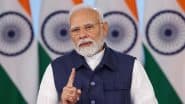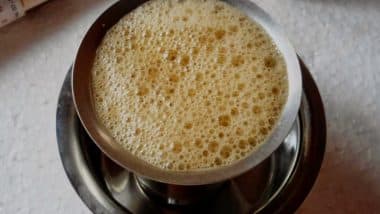Bengaluru, February 20: After the recent metro fare hike, Bengalureans will now have to shell out extra not just for their commute but also for the city's iconic filter coffee. The Bruhat Bangalore Hotels Association (BBHA) has decided to increase coffee prices by 10-15 per cent next month due to rising global coffee bean prices. According to BBHA President P C Rao, coffee bean and powder prices have been steadily increasing since January. The cost has risen by Rs 200 per kg, and further hikes are expected in March.
Citing a global shortage of coffee beans, he said coffee powder prices would rise further and hinted at a potential increase in milk prices as well. "Hence, we have advised all member hotels to hike coffee prices by 10-15 per cent, depending on their current selling rates. Bengaluru is known for its good filter coffee at nominal rates. We charge very reasonable prices. The minimum price of filter coffee starts at Rs 12 and goes up to Rs 40, depending on the hotel," he told PTI. Bengaluru Metro Fare Hike: Namma Metro Announces Revised Fare Structure, Set To Take Effect From February 9; Check Updated Fares.
Highlighting Bengaluru's large coffee-loving customer base, he added, "We don't want to burden our customers, but due to unavoidable circumstances, we are increasing prices only by 10-15 per cent. So, if a coffee currently costs Rs 12 at a particular hotel, it may rise to Rs 14. If it is Rs 15, it may go up to Rs 18, depending on the percentage hike implemented by each hotel."
Responding to a query on whether coffee prices in hotels have already been hiked, Rao said some establishments have increased prices by 10 per cent, while those planning a 15 per cent hike will do so by March. Others will wait until milk prices rise before making adjustments. In a statement, the Indian Coffee Roasters Association noted that India is the seventh-largest coffee producer in the world, producing approximately 3.6 lakh tonnes of coffee annually슬롯사이트�70 per cent Robusta and 30 per cent Arabica.
Currently, about 1.2 lakh tonnes of coffee is consumed domestically, comprising both filter coffee (roast and ground) and instant coffee. "Coffee plantations worldwide are subject to extreme climate variations, impacting both quality and quantity of production, thereby significantly affecting pricing. Until a year ago, Robusta coffee prices were about one-third of Arabica prices," the association said. After Bengaluru, Delhi Metro Planning for a Fare Hike? Here슬롯사이트™s What DMRC Says.
"Now, both are trading at nearly the same levels. India has exported a significant portion of its coffee production this year due to price volatility, earning Rs 10,000 crore in foreign exchange," it added. According to Perikal M Sundar, President of the Indian Coffee Roasters Association, coffee prices have been steadily increasing for over a year. Since January, Robusta prices have surged from approximately Rs 200 per kg to Rs 520 per kg as of February 13, while certain grades of Arabica have jumped from Rs 290 per kg to Rs 750 per kg.
He attributed the price increase to crop losses in Brazil and Vietnam, the world's largest coffee producers, due to unfavorable weather conditions. "This coupled with a limited supply of coffee has led to reduced availability. It appears that global coffee production is declining due to climate change, while high demand in the export market has further reduced domestic availability, driving up prices," he stated. Noting that coffee roasters are finding it increasingly difficult to maintain prices, he said they are "forced to increase the selling price by at least Rs 200 per kg. Prices have already risen by Rs 100 per kg this month, and by March, they will increase by another Rs 100 per kg."













 Quickly
Quickly

















